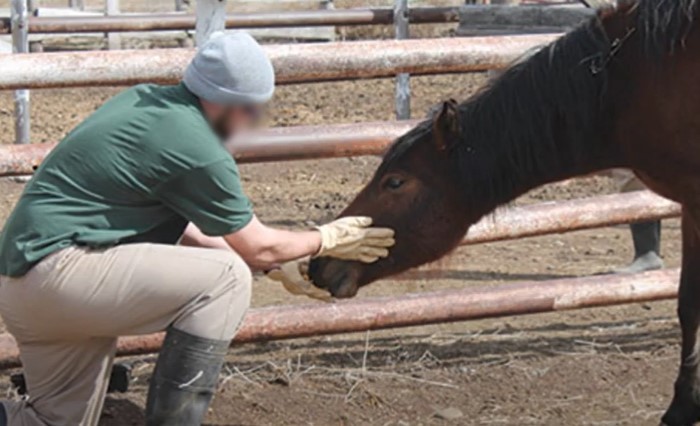Montana Department of Corrections offers unique therapeutic opportunity for residents

Horses aren’t just for herding cattle. At Pine Hills Correctional Facility (PHCF) wild mustangs received from the Bureau of Land Management are a key part of residents’ rehabilitation and preparation to return to Montana communities.
Residents can either work with the horses in the gentling program or be referred to the Equine Assisted Growth and Learning Association (Eagala) therapy program.
“I actually just talked to a counselor, and she said that since her client has been in the Eagala program he has not been on suicide watch,” said Abigail Ryman, a licensed addiction counselor at PHCF and coordinator of the Eagala and horse gentling programs. “For the first two months the client was here, before he started the Eagala program, the counselor had him on suicide watch every other week. She says that she sees a calming feeling in him.”
Four years ago, PHCF Superintendent Steve Ray decided residents at Pine Hills could benefit from developing connections with animals.
“Many of our residents struggle with developing meaningful relationships with other people; more often than not, that’s part of why they are here,” Ray said. “Animals have a unique ability to connect and be a calming force, so we thought establishing the horse gentling program would be a good way to help residents break down some of their barriers.”
Pine Hills received its first two wild mustangs from the Bureau of Land Management in Nevada in November 2018. The gentling process requires patience and understanding on the part of the residents and involves teaching the horses how to wear a halter, be led, accept brushing, and let people pick up their feet. Once the gentling process is complete, the horses are offered for sale to members of the public.
Ryman and her coworker became Eagala certified last year. Eagala is a mental health treatment model that incorporates horses to offer a safe space for clients.
“I think these programs work for residents because it adds an alternative to just people-to-people,” Ryman said. “So, I think bringing in animals — horses, dogs, whatever — kind of adds like an empathy factor.”
Tristan Miller, a resident at Pine Hills, began working with the horses at the end of last year.
“It’s definitely a good feeling, you know,” Miller said. “It’s kind of — it’s a different kind of relaxing feeling. Like a Zen kind of feeling.”
